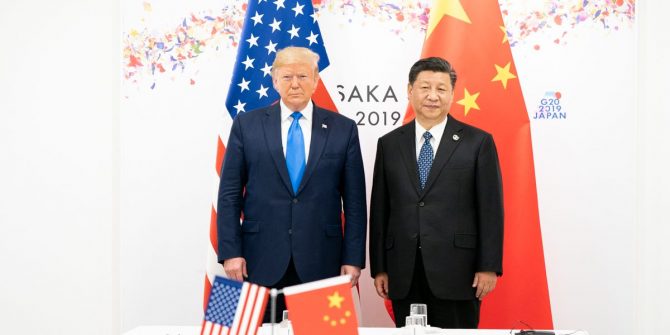What is the prospect of a UK-China trade deal after a no-deal Brexit, ask John Ryan (LSE)? Johnson will have to choose sides when the US-China trade confrontation resumes – an accord with one may mean discord with the other. In the end, however, the US-UK relationship is destined to be more “special” than the UK-China one. Whenever London is forced to choose, it will side with the US.
A post-Brexit United Kingdom will be eager to make trade deals with the United States and with China, the world’s two largest economies and Britain’s biggest trading partners. Prime Minister Boris Johnson is seeking what some British diplomats have called a “special relationship” with both powers, as the UK is hungry for new partners and markets to offset any losses in its relationship with the 27 nations that will remain in the EU. Johnson’s recent comments on Beijing’s Belt and Road Initiative prompted some to speculate that a “Brexit to China” was in the works, though US President Donald Trump has said that he and his UK counterpart, labelled by some as “Britain’s Trump”, have agreed to begin trade talks immediately.
A no-deal Brexit would be very disruptive to trade. It could lead to a serious deterioration of the UK economy if Johnson can’t negotiate favourable parallel trade deals with the US and China in time. The UK already receives more Chinese foreign direct investment than any other EU country and is one of Beijing’s top three trade partners in Europe. Economically, China sees Brexit as an opportunity to speed up a trade deal between the two economies amid an escalating trade war with the US. However, Johnson has to deal with a host of challenges facing London’s relations with both powers amid an intensifying US-China confrontation. In some cases, the British will have to choose sides, as an accord with one may mean discord with the other.
The UK has chosen to side with Beijing before when it became the first major Western country to sign up to China’s Asian Infrastructure Investment Bank (AIIB), which launched in 2016. The UK also has to respond to Trump’s demand that it ban Chinese tech giant Huawei from involvement in Britain’s 5G network. The US has accused the Chinese telecoms equipment provider of spying for Beijing and putting Western communications infrastructure at risk, warning its allies that using Huawei technology could hurt their relationship with Washington. Washington indicated that London may have to pick between it and Beijing. The White House has signalled that any trade pact with Britain would effectively bar it from signing one with China.
Influential UK Politicians, business, and policymakers have called on the UK prime minister to be tougher on China due to what they see as lack of transparency regarding the COVID-19 virus and Hong Kong pro-democracy campaigners being suppressed. The UK press has become more critical, and intelligence agencies are gearing up to focus on the perceived security and economic threats from Beijing.

The UK will know that any policy adjustment Johnson makes would have to maintain the delicate balance in London’s relations with Washington and Beijing. While Britain may seek short-term economic gains from working with China, it has long been at odds with Beijing over a host of thorny issues such as human rights, Tibet, Taiwan, Hong Kong, and regional and global security matters. That is why the first “golden era” of Sino-British relations appeared to have faded within a year of it being announced, with some Chinese media declaring it finished following the 11th-hour decision by Johnson’s predecessor to delay the China-backed nuclear power project at Hinkley Point over security concerns. In the end, the US-UK relationship is destined to be more “special” than the UK-China one. Whenever London is forced to choose, it will side with the US.
From China’s perspective, the scale of the UK’s interactions with China means that the relative standing of the EU – and with it its status as a ‘major power’ in the current Chinese diplomatic approach – is likely to diminish with Brexit. The EU27 as a trade and investment partner for China will be weaker.
Brexit means that on leaving the EU, the UK will lose European banking passport rights that allow UK-based banks to sell financial services directly and actively to EU-based customers. The UK would then have to apply for separate licenses in each member country and find intermediaries to work with. However, even without the banking passport, EU-based companies would still be able to buy interest-bearing products directly from UK banks by seeking them out. European companies that earn RMB from trade would therefore still be able to deposit those revenues in London.
Britain became the first country ever to leave the 28-nation European Union. This heralds a transition period for Britain and the EU, during which their future relationship will be negotiated, particularly in trade. Prime Minister Johnson says these negotiations must conclude by December 31st 2020, meaning a no-deal Brexit if no trade deal is agreed, with Britain leaving on “most favoured nation” terms under World Trade Organisation rules. These are the same rules under which Britain currently operates much of its global trade, including with China, Russia, and the United States, and is, therefore, a feasible default position.
A no-deal Brexit is an unpredictable outcome that poses a risk to global financial stability. Regardless of how EU and Chinese leaders choose to answer the questions posed by Brexit, the instability and uncertainty will not end anytime soon, especially with the negative impacts of COVID-19 on the global economy and political discourse.
This article gives the views of the author, and not the position of LSE Brexit, nor of the London School of Economics. Image: Public domain.




“In the end, the US-UK relationship is destined to be more “special” than the UK-China one. Whenever London is forced to choose, it will side with the US.” This is a no-brainer. We have far more in common than we do with China. Moreover, the coronavirus, whose origins are by common consensus in China, changes everything; the virus wreaking such economic havoc the world over, that it is impossible to see how a ‘UK-China Special-Relationship’ could ever be sustained.
We should be under no illusion that a relationship between the UK and the USA will be easy; it will not, but when the chips are down, the USA is to be preferred over China.
“A no-deal Brexit is an unpredictable outcome that poses a risk to global financial stability.”
I think you have lost all perspective. For the UK it is an important issue, for the rest of the world it is a minor blip compared to what coronavirus will do to the world economies.